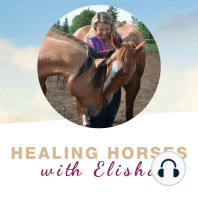20 min listen

29: The #1 Way to Promote Prevention & Recovery from Equine Metabolic Syndrome (EMS)
29: The #1 Way to Promote Prevention & Recovery from Equine Metabolic Syndrome (EMS)
ratings:
Length:
20 minutes
Released:
Apr 23, 2024
Format:
Podcast episode
Description
Today, we are diving into the best method for preventing and promoting recovery from Equine Metabolic Syndrome. While equine health issues often get labeled for clarity, it is essential to understand that with EMS, PPID, and PSSM, the underlying imbalances are remarkably similar and interconnected, particularly regarding metabolism. A holistic approach will address those issues while also restoring overall balance within all the biochemical processes of thehorse. Stay tuned to learn about the most significant imbalances to consider for prevention and recovery from EMS, their causes, and ways to prevent them.Imbalances and Key ConsiderationsWhen addressing Equine Metabolic Syndrome, horse owners must focus on regulating blood sugar, insulin, and cortisol due to their significant impact on metabolic processes and overall health. High insulin levels can cause tissue damage, especially in the feet, while elevated cortisol contributes to various health issues, including immune-related conditions and behavioral changes. Adopting a multifaceted approach that considers these imbalances holistically is crucial for effective prevention and recovery.Causes of ImbalancesThe primary causes of imbalances in horses with EMS, PPID, or PSSM are sugar and stress. Chronic elevation of blood sugar and stress hormones like cortisol can lead to metabolic dysregulation and exacerbate existing conditions. Managing these factors through diet, lifestyle adjustments, and stress reduction techniques is essential for preventing and treating metabolic issues.Prevention and Lifestyle StrategiesCreating a healthy environment for horses involves four key aspects:LifestyleDietNutritional therapyHerbal supportLifestyle modifications, managing stress levels, and ensuring adequate exercise and social interactions are crucial for maintaining horses' overall health. Developing a personalized diet that addresses nutrient deficiencies, regulates blood sugar, and supports metabolic function is essential, and incorporating nutritional therapy and herbal supplements can also enhance their metabolic balance and overall well-being.Holistic Approach for Optimal HealthBy combining lifestyle adjustments, dietary modifications, nutritional therapy, and herbal support, horse owners can significantly improve the health of their horses. A holistic approach addresses the root causes of imbalances, promotes metabolic function, and supports overall vitality. With proper management and attention to those key factors, horses can experience substantial improvements in their quality of life and metabolic health.Links and resources:Connect with Elisha Edwards on her website Join my email list to be notified about new podcast releases and upcoming webinars.Free Webinar Masterclass: Four Steps to Solving Equine Metabolic Syndrome NaturallyRegister for Resolving Equine Metabolic Syndrome Naturally nowMentioned in this episode:Learn the 4 Steps to Resolving Metabolic Syndrome NaturallySign up for the FREE masterclass today!Masterclass
Released:
Apr 23, 2024
Format:
Podcast episode
Titles in the series (32)
03: Feeding Horses Beet Pulp - the Myths and Facts by Healing Horses with Elisha